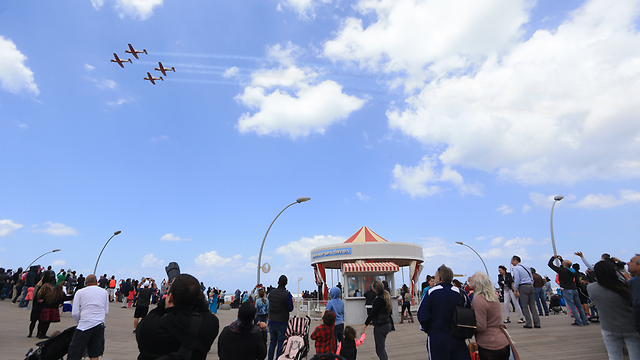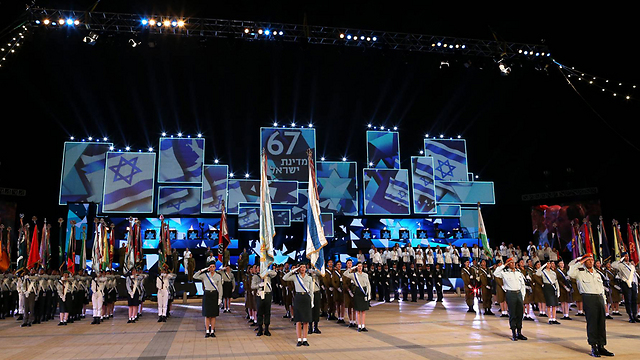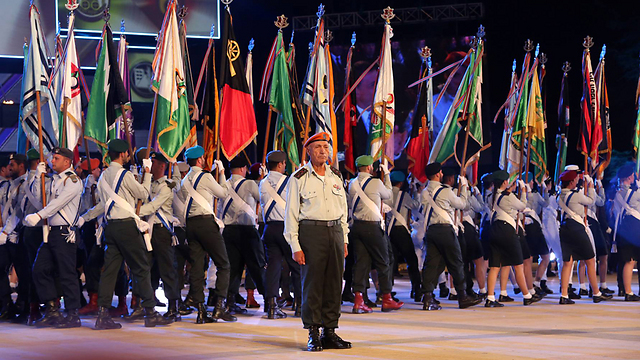What's to celebrate?
Asher Schechter is followed by a news report from Ynet news.
Israel celebrates its ‘independence’ with military displays and an announcement from the American V-P that the US will deliver new F-35 jets to Israel, confirming Israeli dependence on the US and military hardware. Vowing the United States would make sure Israel maintained its “qualitative edge,” Biden told the audience at the US Israeli embassy: “Next year we will deliver to Israel the F-35 Joint Strike Fighter, our finest, making Israel the only country in the Middle East to have this fifth-generation aircraft.” Ynet.
Why I won’t be celebrating Israel’s Independence Day this year
Should we really raise a glass to Israel’s rapid descent into a moral and political abyss?
By Asher Schechter, Ha’aretz
April 23, 2015
Israel is celebrating its Independence Day. And it will do so, for the first time in 29 years, without me there. As my family, friends and almost everyone I know back home gathers around a grill for barbecues, I will be 5,600 miles away in New York City.
I suppose I could have found some way to celebrate with them, if I wanted to. I could have Skyped into the festivities, or sought the company of fellow Israelis and sympathetic Jews here in the United States. But I plan to do no such thing. In fact, I plan to avoid anything and everything Israeli today. Goodbye, Facebook newsfeed – I’ll see you tomorrow. Goodbye, Twitter. I may even avoid meat – barbecued or otherwise – for a day.
After all, what is there to celebrate this year? The past 12 months in Israel have been rife with internal and external conflicts, international isolation and political corruption. It saw an operation in Gaza last summer that claimed the lives of more than 2,000 Palestinians and 70-plus Israelis, and then was almost instantly forgotten. It saw an ugly election campaign that pitted Israelis against each other: right against left; Jews against Arabs; Ashkenazim against Sephardim; secular against religious – and the reelection of Prime Minister Benjamin Netanyahu.
Should we raise a glass to Israel’s rapid descent into a moral and political abyss? Should we congratulate the young nation on its narrowing democracy, on the growing reliance of its leaders on nationalism and bigotry, on the emotional numbness that seems to have overtaken it in recent years? Should we cheer for the untimely death of the two-state solution, or maybe Israel’s dangerous steps toward apartheid?
Or maybe for the reelection of Netanyahu, which all but guarantees Israel will remain on the same path? Should we toast despair, celebrate apathy? Were national holidays created to ignore or otherwise celebrate stagnation?
As Israel continues down its path of isolation and conflict, and does so with renewed verve, I find my disappointment outweighing my sense of national pride.
I suspect I’m not alone in this. When I talk to family, friends and sources back home, it seems many others aren’t particularly excited about celebrating this year.
But even the heartbroken will celebrate, of course – same as everyone. Sometimes, during rough times, Independence Days in Israel have a certain atmosphere of forced joy, a pretence of almost-improbable optimism. Perhaps this year is no different in that regard: there’s a lot that you need to ignore in order to be cheerful for a day.
And all signs point to next year being even rougher for Israel. In a year that almost saw Israel drop the “democratic” out of its self-definition as a “Jewish democratic state,” extremism and political violence seem to have won, in the streets and the polls.
Diplomatically, it’s hard to imagine a time in which Israel was more isolated. Economically, Israelis find themselves indebted, with housing prices and the cost of living showing no signs of falling.
As it celebrates its 67th Independence Day, Israel has never been more “independent” – alienating its closest allies; insisting it can do whatever it wants, regardless of what anyone else has to say.
Maybe worst of all: The past year saw its illusions of normalcy perish. Cultivated carefully over a decade of relative peace, any illusion that Israel can be a country like all countries – a Startup Nation built on innovation and high-tech, a country that perfectly mixes the Jewish and the democratic – has been exposed.
And by reelecting those that have been in power during all this, Israelis chose in effect to keep things as they are.
So really, what is there to celebrate? It’s not that things didn’t happen; it’s just that if ever there was a time where dark exceeds light, it’s now.
Most Israelis will celebrate, of course. They’ll celebrate in Tel Aviv and Jerusalem, in New York and Los Angeles, in Miami and Berlin. They’ll grill meat, and beat each other over the head playfully with plastic hammers, and rejoice that their country is still here, despite everything. Silently, among themselves, many will wish that they have more to be happy about next year. But right now, they’re still here. And often in Israel, that’s good enough.
I, on the other hand, am far too pessimistic to take part. Far away from my country, I can see it far more clearly. Twelve months from now, when Israel celebrates its 68th birthday, things might look decidedly better. They might. And if they do, there will definitely be cause for celebration.
As it stands, though, when I think of my homeland, my first instinct is to wallow, to lament, not to feel overjoyed.

Watching the IAF flyover to celebrate Independence Day. Photo by Yaron Brenner.
Israel welcomes Independence Day with torch-lighting ceremony
Fourteen Israelis light torches at the traditional ceremony at Mt. Herzl, trailblazers who contributed to Israeli innovation and excellence.
Celebrating Dependence Day with
Israel made the jarring move from grief to joy on Wednesday evening, welcoming Independence Day with a torch-lighting ceremony at Mt. Herzl in Jerusalem.
The torch-lighting ceremony, which officially marks the beginning of Independence Day celebrations, focused this year on trailblazers – outstanding Israelis who reached unusual and inspiring achievements and have made a significant contribution to Israeli innovation and excellence in different walks of life, including: Science and technology, defense, economics, medicine, agriculture, culture and sports.
But before official Independence Day celebrations could start, Herzl Shaul, the father of Oron Shaul who was killed in battle in Saja’iyya last summer, read out the Yizkor (“remembrance”) prayer, in honour of Israel’s fallen soldiers and terror victims.
Col. (res.) David Rokani, who commanded the ceremony for the 33rd year in a row, then asked Knesset Speaker Yuli Edelstein permission to start the ceremony.
The Israeli flag was then raised to the top of the flagpole, and the celebration of Israel’s 67th Independence Day began.
Unusually, Prime Minister Benjamin Netanyahu’s Independence Day greeting this year was pre-taped and aired on screens at Mt. Herzl.
“At the onset of this Independence Day I want to first and foremost salute you, the soldiers of the IDF, and all of the security forces,” Netanyahu said. “Last summer, we saw your fighting spirit, your comradeship and the bravery in your hearts during Operation Protective Edge. You’re the first layer of Israel’s security and independence. On this Independence Day we look back at Israel’s 67 years of existence with great pride. And we look forward with hope and prayer.”
Knesset Speaker Yuli Edelstein lit the central torch, and received a lot of applause when he said in his speech: “I love this country, but more than that I love this people. The residents of central Israel and those in the periphery; the people of the kibbutzim and moshavim; the settlers in Judea and Samaria, and the minorities; the people of the humanities and literature, academia and art. And yes – also those who kiss the mezuzah and pray at righteous’ graves.”
Edelstein, who was hinting at controversial comments made by artist Yair Garbuz before the recent elections, went on to say: “We have to rise above our disagreements and our different camps, strengthen what we have in common, condemn extremism, patronizing, racism and violence.”
After Edelstein came 14 outstanding Israelis who lit the remaining 12 torches.
One of them is Israeli Arab journalist Lucy Aharish, who was teary-eyed and emotional, and even spoke in Arabic.
She lit a torch “in honour of those who are no longer with us and were victims of unjustified hatred from those who forgot we were all born in the image of one God; the Sephardic and Ashkenazi; the religious and secular; Arabs and Jews. For the children of this land who remind us we have no other country, in honour of us, the Israelis, for human beings, and for the glory of the State of Israel.”
After the lighting of the 12 torches, and a performance from Oz Zehavi, it was time for the performance of the IDF flag bearers, who formed different images.

Alongside the traditional images of the Star of David, the word “IDF” in Hebrew and the number “67”, the flag bearers also created the image of a disk-on-key, the Waze logo, a drone, a Merkava tank and the Iron Dome – all Israeli inventions.
The 120 excelling soldiers, who will be honoured at a ceremony at the President’s Residence on Thursday, created an image of the Menorah.
At the end of the ceremony, the Jerusalem municipality launched its fireworks display.

